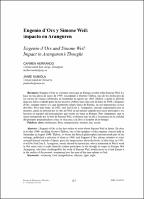Por favor, use este identificador para citar o enlazar este ítem:
https://repositorio.usj.es/handle/123456789/1035
Registro completo de metadatos
| Campo DC | Valor | Lengua/Idioma |
|---|---|---|
| dc.contributor.author | Herrando, Carmen | - |
| dc.contributor.author | Nubiola, Jaime | - |
| dc.date.accessioned | 2024-01-18T14:16:39Z | - |
| dc.date.available | 2024-01-18T14:16:39Z | - |
| dc.date.issued | 2022 | - |
| dc.identifier.citation | Carmen Herrando y Jaime Nubiola, “Eugenio d’Ors y Simone Weil: impacto en Aranguren”, en Revista de Hispanismo filosófico, nº 27 (2022), pp. 115-133. ISSN: 1136-8071 | en_US |
| dc.identifier.issn | 1136-8071 | en_US |
| dc.identifier.uri | https://repositorio.usj.es/handle/123456789/1035 | - |
| dc.description | Eugenio d’Ors is the first author to write about Simone Weil in Spain. He does it in May 1949, recalling Gustave Thibon, one of the speakers of the summer courses held in Santander in August 1948. Thibon, to whom the French philosopher had entrusted part of her writings, published a selection of them in 1948, and Eugenio d’Ors, always attentive to what aroused interest outside of Spain, gives his impressions about the book. A little later, in 1951, it will be José Luis L. Aranguren, surely alerted by his teacher, who is interested in Weil’s work in that same vein to make Spanish readers participate in the thought in vogue in Europe. But Aranguren, who feels challenged by the work of Simone Weil, dwells more on it and frames it in the reality of the present, wondering how the man of his time relates to God. | en_US |
| dc.description.abstract | Eugenio d’Ors es el primer autor que en España escribe sobre Simone Weil. Lo hace en una glosa de mayo de 1949, recordando a Gustave Thibon, uno de los profesores de los cursos de verano celebrados en Santander en agosto de 1948. Thibon, a quien la filósofa francesa había confiado parte de sus escritos, publicó una selección de ellos en 1948, y Eugenio d’Ors, siempre atento a lo que despertaba interés fuera de España, da sus impresiones acerca del libro. Poco más tarde, en 1951, será José Luis L. Aranguren, alertado seguramente por su maestro, quien se interese por la obra de Weil en ese mismo empeño por hacer partícipes a los lectores en español del pensamiento que estaba en boga en Europa. Pero Aranguren, que se siente interpelado por la obra de Simone Weil, se detiene más en ella y la enmarca en la realidad del presente preguntándose cómo se relaciona con Dios el hombre de su tiempo. | en_US |
| dc.format.extent | 19 p. | en_US |
| dc.format.mimetype | application/pdf | en_US |
| dc.language.iso | spa | en_US |
| dc.publisher | Asociación Hispanismo filosófico | en_US |
| dc.relation.requires | Adobe | en_US |
| dc.rights | Attribution-NonCommercial-NoDerivatives 4.0 Internacional | * |
| dc.rights.uri | http://creativecommons.org/licenses/by-nc-nd/4.0/ | * |
| dc.subject | Testimonio | en_US |
| dc.subject | Dios | en_US |
| dc.subject | Interpelación | en_US |
| dc.subject | Ateísmo | en_US |
| dc.subject | Luz | en_US |
| dc.subject | Noche. | en_US |
| dc.subject | Testimony | en_US |
| dc.subject | God | en_US |
| dc.subject | Interpellation | en_US |
| dc.subject | Atheism | en_US |
| dc.subject | light | en_US |
| dc.subject | Night. | en_US |
| dc.title | Eugenio d’Ors y Simone Weil: impacto en Aranguren | en_US |
| dc.type | journal article | es_ES |
| dc.identifier.publicationfirstpage | 115 | en_US |
| dc.identifier.publicationlastpage | 133 | en_US |
| dc.rights.accessRights | open access | es_ES |
| Aparece en las colecciones: | Artículos de revistas | |
Ficheros en este ítem:
| Fichero | Descripción | Tamaño | Formato | |
|---|---|---|---|---|
| Eugenio Dors_Revista de hispanismo_27.pdf | 130,74 kB | Adobe PDF |  Visualizar/Abrir |
Este ítem está sujeto a una licencia Creative Commons Licencia Creative Commons

